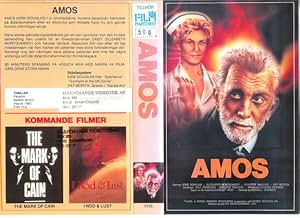moviescout.org – The 1985 TV movie “Amos” offers a poignant and insightful look into the lives of residents in a retirement home, highlighting the challenges and injustices they face. With a powerful narrative and a stellar cast, this film sheds light on the often-overlooked experiences of the elderly, advocating for dignity and respect in later life.
Plot Overview
“Amos” centers around the character of Amos Lasher, portrayed by Kirk Douglas, a former professional baseball player who finds himself living in a retirement home after the death of his wife. As Amos adjusts to his new surroundings, he becomes increasingly aware of the oppressive and neglectful conditions within the facility, run by a domineering head nurse played by Elizabeth Montgomery.
The film follows Amos as he befriends other residents and begins to challenge the injustices they endure, from lack of autonomy to emotional and physical mistreatment. His determination to stand up for himself and his fellow residents becomes a catalyst for change, sparking a courageous fight for their rights and dignity.
Themes and Social Commentary
“Amos” delves into themes of aging, autonomy, and human rights. It highlights the struggles faced by elderly individuals who are often marginalized and disempowered within institutional settings. The film emphasizes the importance of compassion, respect, and advocacy for those who may be vulnerable due to age or circumstance.
By portraying the harsh realities of life in a retirement home, “Amos” raises awareness about the systemic issues within elder care facilities and the need for reform. It also celebrates the resilience and wisdom of its characters, underscoring the value and potential of every stage of life.
Critical Reception
“Amos” received critical acclaim for its poignant storytelling and strong performances, particularly by Kirk Douglas and Elizabeth Montgomery. The film was praised for its sensitive and realistic depiction of the elderly and its ability to raise important social issues. It resonated with audiences and critics alike, drawing attention to the need for better care and respect for senior citizens.
Legacy
The legacy of “Amos” lies in its powerful advocacy for the rights and dignity of the elderly. It remains a relevant and thought-provoking film that continues to inspire discussions about aging, elder care, and the societal attitudes towards older adults. By highlighting the humanity and agency of its characters, “Amos” serves as a reminder of the importance of empathy and justice for all individuals, regardless of age.
